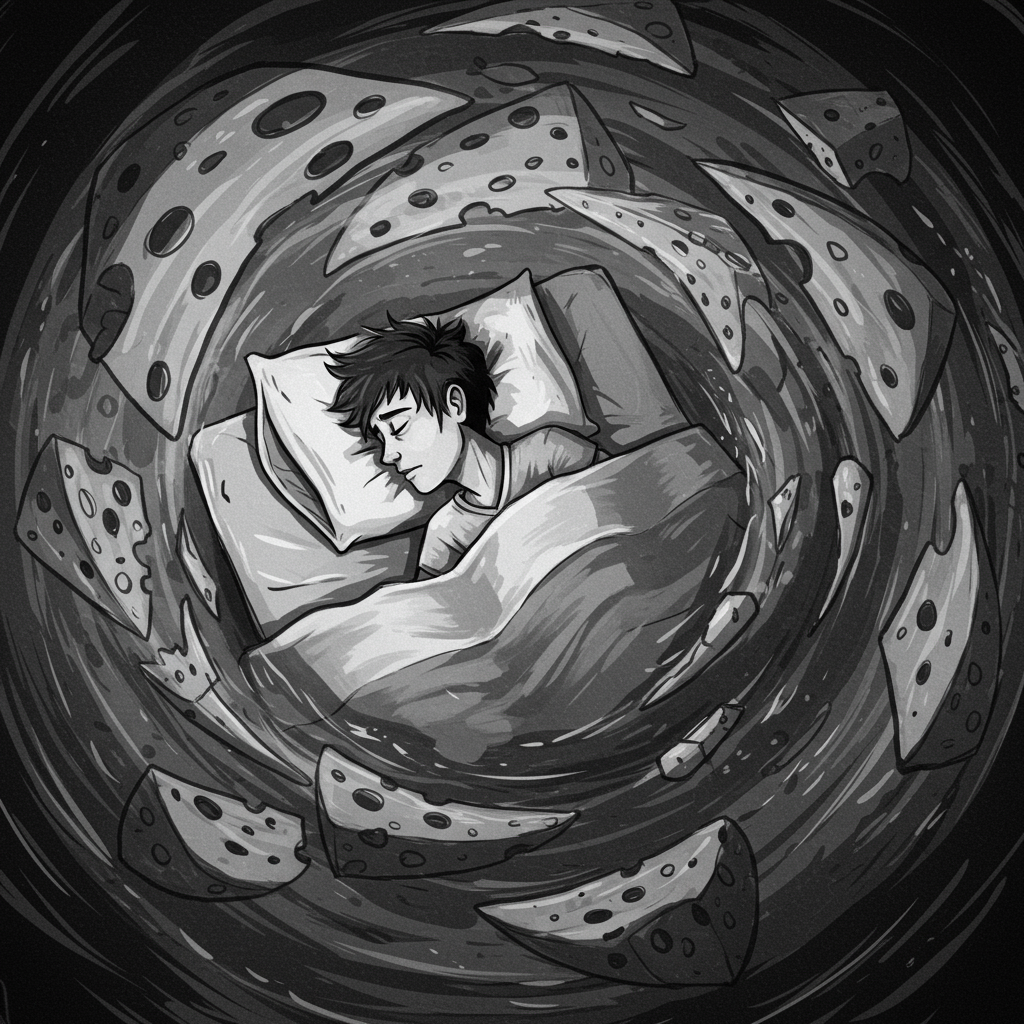For centuries, folklore suggested that a late-night snack of cheese could lead to vivid, unsettling dreams or even full-blown nightmares. From literary references to early 20th-century comic strips like “Dream of the Rarebit Fiend,” this idea has been a persistent cultural belief. But is there any scientific truth behind the notion that your diet, particularly what you eat before bed, can influence your sleep and the content of your dreams? Recent research suggests the answer is more complex than a simple block of cheddar causing spooky visions.
A new study delves into the connection between food, sleep quality, and dream characteristics. It confirms that while the old cheese myth has a kernel of truth, the real story involves food sensitivities, digestive comfort, and the timing of your meals. It appears your gut might indeed be subtly pulling the strings behind the curtain of your dream world.
The Age-Old Myth Meets Modern Science
The idea that certain foods trigger bad dreams is deeply rooted in various cultures. Eating rich or heavy foods before sleep has long been cautioned against, with cheese often singled out. However, despite this widespread belief, scientific studies specifically examining the link between particular foods and dreams have been surprisingly scarce.
This lack of concrete evidence left the “cheese dream” concept largely in the realm of anecdote and superstition. Scientists hadn’t extensively explored whether consuming dairy – or any other specific foods – close to bedtime truly impacted how well people slept or the nature of their nocturnal experiences.
Exploring the Diet-Sleep-Dream Connection
To investigate this intriguing link, researchers at the Université de Montréal in Canada, led by Dr. Tore Nielsen, conducted a comprehensive online survey. They recruited over 1,000 undergraduate students from MacEwan University in Alberta, averaging around 20 years old. Participants provided detailed information about their dietary habits, sleep quality, frequency of dream recall, known food sensitivities or allergies, and general health status. The goal was to identify potential associations between what and when people ate and how they slept and dreamed.
The survey revealed that a significant number of participants, over 40%, felt their eating habits influenced their sleep in some way. Among these, roughly half reported that certain foods made their sleep worse, while the other half believed foods improved their sleep.
Foods most frequently blamed for disrupting sleep included common culprits like desserts and other sweets, spicy dishes, and dairy products. Conversely, foods associated with better sleep often involved healthier options such as fruits, vegetables, and soothing beverages like herbal tea.
Food Sensitivities and Nightmare Frequency
Interestingly, only a smaller fraction of the participants, about 5.5%, specifically believed that food impacted their dreams. However, within this group, desserts, sweets, and dairy products were the most commonly cited culprits linked to experiencing bizarre, unusually vivid, or disturbing dreams.
Crucially, the study found a strong association between food sensitivities and the frequency of nightmares. Participants who reported having lactose intolerance or other types of food allergies tended to experience more nightmares overall.
The link between lactose intolerance and nightmares was particularly significant. Researchers found this connection was largely explained by the gastrointestinal (GI) symptoms that often accompany lactose consumption in sensitive individuals, such as bloating, gas, or cramps. These uncomfortable physical sensations can disrupt sleep architecture, potentially leading to more disturbed dreams or awakenings during REM sleep, the stage where most vivid dreaming occurs.
Dr. Nielsen noted that nightmare severity is strongly tied to lactose intolerance and other allergies. He explained that severe GI symptoms suffered by lactose-intolerant people often disrupt sleep, making nightmares worse. This supports the understanding that bodily discomfort can influence dream content. Food allergies, however, seemed to predict nightmare frequency independently of reported GI symptoms, suggesting other mechanisms might be at play for different sensitivities.
Timing is Everything: Late-Night Eating Habits
Beyond the type of food, the study also highlighted the importance of when you eat. Eating late in the evening or during the night was strongly associated with poorer sleep quality. This habit was also linked to experiencing more negative dream content and a higher frequency of nightmares.
In contrast, participants who reported healthier eating habits, which included consuming foods aligned with their body’s needs and generally avoiding late-night meals, tended to report better dream recall and more positive dream content. This suggests that consistent, mindful eating patterns throughout the day, and giving your digestive system a break before bed, could contribute to more restful sleep and pleasant dreams.
Practical Takeaways for Better Sleep and Dreams
While this study was correlational and cannot definitively prove that food causes nightmares, its findings offer valuable insights and potential strategies for individuals struggling with sleep disturbances or frequent bad dreams.
For those who experience regular nightmares, particularly if they also have known food sensitivities like lactose intolerance, the study suggests that tracking dietary intake could be beneficial. Identifying and potentially reducing the consumption of trigger foods, especially close to bedtime, might help alleviate symptoms.
Based on the findings, focusing on whole foods and avoiding heavy, sugary, or dairy-rich meals in the hours before sleep could improve both sleep quality and the tone of your dreams. This aligns with general advice for good sleep hygiene, emphasizing light evening meals and avoiding anything that might cause digestive upset or energy spikes before bed.
The research adds to the growing body of evidence highlighting the intricate connection between gut health and overall well-being, including mental and emotional states like anxiety or mood, which can certainly influence dreams. Adjusting your diet presents a relatively low-risk, non-pharmacological approach that might improve sleep quality and potentially reduce the frequency or intensity of nightmares.
Study Limitations and Future Research
It’s important to remember the limitations of this study. Being a correlational design, it shows associations but cannot prove cause and effect. Does diet affect dreams, do dreams affect diet (perhaps influencing food choices), or is there another factor influencing both? The study design can’t answer this directly.
The participant group was also quite specific: primarily young, Canadian university students. This means the results might not apply universally to older adults, different populations, or individuals with different cultural beliefs or dietary norms. The reliance on self-reporting is another limitation, as participants’ memories and perceptions might not always be completely accurate.
Dr. Nielsen acknowledges these limitations and calls for further research. Future studies should include more diverse populations spanning different ages and backgrounds. Experimental studies, where participants consume specific foods before sleep in a controlled setting, are needed to more definitively test causal links and determine if people can truly detect the effects of particular foods on their dreams.
Frequently Asked Questions
What did the new study find about food and dreams?
A recent study found that while eating affects sleep for many people, only a small percentage believe food directly affects dreams. However, the study identified a significant link between food sensitivities like lactose intolerance and allergies, and experiencing more nightmares. It suggests that for lactose intolerance, this link is primarily due to uncomfortable digestive symptoms disrupting sleep, which can then impact dreams. Late-night eating in general was also associated with poorer sleep and more negative dreams.
What kinds of foods and eating habits were linked to worse sleep or nightmares?
The study found that participants frequently blamed desserts, sweets, spicy foods, and dairy products for worsening their sleep. When it came to dreams, desserts, sweets, and dairy were most often linked to bizarre or disturbing dreams. Late-night eating (eating in the evening or during the night) was specifically associated with poor sleep quality, more negative dreams, and increased nightmares.
Can changing your diet really help reduce nightmares?
Based on the study’s findings, for some people, adjusting their diet might help. If you have lactose intolerance or other food sensitivities and experience frequent nightmares, reducing or avoiding those trigger foods, especially before bed, could potentially alleviate sleep disruption caused by digestive discomfort. Generally avoiding heavy, sugary, or dairy foods late at night and focusing on healthier eating habits throughout the day was linked to better sleep and more positive dreams in the study. While not a guaranteed cure, it’s a practical, low-risk strategy to consider.
Conclusion
The long-held belief that cheese causes nightmares might not be entirely baseless, but the mechanism appears more nuanced than previously imagined. This latest study suggests that it’s not just cheese, but potentially any food that causes digestive distress or disrupts sleep, particularly in individuals with sensitivities. Lactose intolerance and food allergies show a stronger correlation with nightmares, often linked to the discomfort they cause. Furthermore, simple habits like avoiding late-night meals may also play a significant role in fostering restful sleep and potentially more pleasant dreams. While more research is needed, especially controlled experimental trials, exploring the impact of your diet on your sleep and dream life offers a promising, accessible path towards potentially improving your nights. Paying attention to how your body reacts to certain foods, especially before bed, could be a valuable step towards unlocking better sleep and leaving those unsettling cheese dreams behind.



